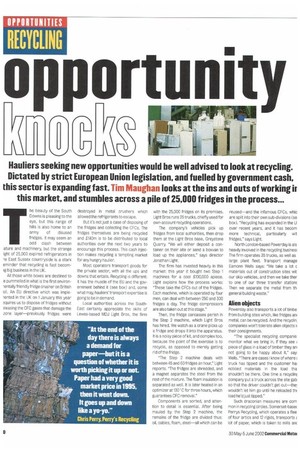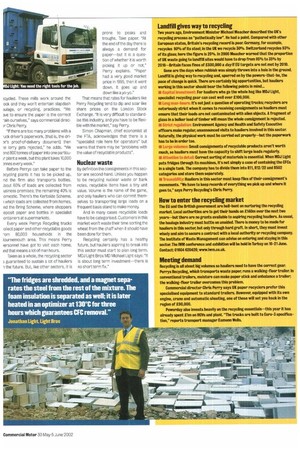opportun
Page 40

Page 41

If you've noticed an error in this article please click here to report it so we can fix it.
Hauliers seeking new opportunities would be well advised to look at recycling. Dictated by strict European Union legislation, and fuelled by government cash, this sector is expanding fast. Tim Maughan looks at the ins and outs of working ir this market, and stumbles across a pile of 25,000 fridges in the process...
The beauty of the South Downs is pleasing to the eye, but this range of hills is also home to an army of disused fridges. It may seem an odd clash between ature and machinery, but the strange ight of 25,000 expired refrigerators in le East Sussex countryside is a stark eminder that recycling is fast becomig big business in the UK.
All those white boxes are destined to e pummelled in what is the first environientally friendly fridge crusher on British oil. An EU directive which was implelented in the UK on 1 January this year squires us to dispose of fridges without aleasing the CFC gases that damage the zone layer—previously fridges were destroyed in metal crushers which allowed the refrigerants to escape.
But it's not just a case of disposing of the fridges and collecting the CFCs. The fridges themselves are being recycled and £140m is to be distributed to local authorities over the next two years to encourage this process. This cash injection makes recycling a tempting market for any hungry haulier.
Most operators transport goods for the private sector, with all the ups and downs that entails. Recycling is different: it has the muscle of the EU and the government behind it (see box) and, come what may, hauliers' transport expertise is going to be in demand.
Local authorities across the SouthEast certainly appreciate the skills of Lewes-based MDJ Light Bros, the firm with the 25,000 fridges on its premises. Light Bros runs 25 trucks, chiefly used for own-account recycling operations.
The company's vehicles pick up fridges from local authorities, then drop them at the Light Bros base, Greystone Quarry. "We will either deposit a container on their site or send a boxvan to load up the appliances," says director Jonathan Light.
The firm has invested heavily in this market: this year it bought two Step 1 machines for a cool £100,000 apiece. Light explains how the process works: "These take the CFCs out of the fridges. Each machine, which is operated by four men, can deal with between 250 and 300 fridges a day. The fridge compressors are also taken out at this stage."
Then, the fridge carcasses perish in the Step 2 machine, which Light Bros has hired. We watch as a crane picks up a fridge and drops it into the apparatus. It is a noisy piece of kit, and complex too, because the paint of the exercise is to recycle, as opposed to merely getting rid of the fridge.
"The Step 2 machine deals with between 45 and 60 fridges an hour," Light reports. "The fridges are shredded, and a magnet separates the steel from the rest of the mixture. The foam insulation is separated as well. It is later heated in an optimizer at 130 °C for three hours, which guarantees CFC removal."
Components are sorted, and attention to detail is essential. After being mauled by the Step 2 machine, the remains of the fridge are divided thus: oil, cables, foam, steel—all which can be reused—and the infamous CFCs, whic are split into their own sub-divisions (se box). "Recycling has expanded in the U over recent years, and it has becom more technical, particularly wit fridges," says Light.
North London-based Powerday is als heavily involved in the recycling businesE The firm operates 35 trucks, as well as large plant fleet. Transport manage Eamonn Wells says: "We take a lot c materials out of construction sites wit our skip vehicles, and then we take ther to one of our three transfer stationE Then we separate the metal from th general building waste."
Alien objects
Powerday also transports a lot of timbe from building sites which, like fridges an' metal, can be recycled. And the recychn, companies won't tolerate alien objects ii their consignments.
"The specialist recycling companie: monitor what we bring in. If they see ; piece of glass in a load of timber they an not going to be happy about it," say. Wells. "There are cases I know of where ; truck has tipped and the customer ha noticed materials in the load tha shouldn't be there. One time a recyclini company put a truck across the site gat( so that the driver couldn't get out—the; wouldn't let him go until he reloaded th( load he'd just tipped."
Such draconian measures are cam mon in recycling circles. Somerset-base( Perrys Recycling, which operates a flee of four artics and 12 rigids, transports lot of paper, which is taken to mills an(
)cycled. These mills work around the ock and they won't entertain slapdash aulage, or recycling, practices. "We eve to ensure the paper is the correct -ain ourselves," says commercial direc)rChris Perry.
"If there are too many problems with a .uck driver's paperwork, [that is, the driar's proof-of-delivery document] then me lorry gets rejected," he adds. "We and 800 tonnes of paper into one particuir plant a week, but this plant takes 10,000 )nnes every week."
Before Perrys can take paper to the acycling plants it has to be picked up, nd the firm also transports bottles. ,bout 60% of loads are collected from usiness premises; the remaining 40% is omestic. There's the Kerbside Scheme, which loads are collected from homes, nd the Bring Scheme, where shoppers eposit paper and bottles in specialist ontainers at supermarkets.
Every week Perrys Recycling trucks ollect paper and other recyclable goods rom 80,000 households in the kuirnemouth area. This means Perry iersonnel have got to visit each home, ind that means a lot of man hours.
Taken as a whole, the recycling sector s guaranteed to sustain a lot of hauliers the future. But, like other sectors, it is prone to peaks and troughs. Take paper. "At the end of the day there is always a demand for paper—but it is a question of whether it is worth picking it up or not," Perry explains. "Paper had a very good market price in 1995, then it went down. It goes up and down like a yo-yo."
That means that rates for hauliers like Perry Recycling tend to dip and soar like share prices on the London Stock Exchange. "It is very difficult to standardise this industry, and you have to be flexible with the market," say Perry.
Simon Chapman, chief economist at the FTA, acknowledges that there is a "specialist role here for operators" but warns that there may be 'problems with the value of recyclable products".
Nuclear waste
By definition the consignments in this sector are second-hand. Unless you happen to be recycling nuclear waste or bank notes, recyclable items have a tiny unit value. Volume is the name of the game, and only hauliers who can commit themselves to transporting large loads on a frequent basis stand to make money.
And in many cases recyclable loads have to be categorised. Customers in this market won't waste their time sorting the wheat from the chaff when it should have been done for them.
Recycling certainly has a healthy future, but hauliers aspiring to break into this sector must start to plan long term. MDJ Light Bros MD Michael Light says: "It is about long term investment—there is no short term fix."
























































































































































